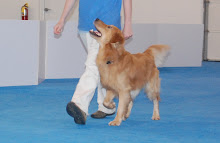
I'm somewhat learning how to do this blog-hyperlink-thing. I'm learning. Slowly.
Interesting posts by clever people yesterday. Posts? Blog post. (...item. Whatever it is called.)
And that clever post followed by clever comments got me thinking about the "being wrong".
Of course few being /like/ being wrong. Or is it? Is that what we've just come to know and love? But I suppose, being right tends to result in good things happening (yay, you answered the question right and get $1000, or pass the test, or...) or avoid bad things ("Wow, we did turn the right way back there. Otherwise we'd have gone 10 miles off our course.... "Yay..I -did- get the question right and I pass the test" "Yay, I did lock my house and so no one stole the really hideous antique items I hate.")
Maybe those were poor examples. But if being wrong was more enjoyable, that'd make life really difficult, and arguably isn't possible because if you liked eating poisonous things or trespassing onto someone else's territory, there could be serious consequences...like death.
Right?
So what does this have to do with dog training? We need to help our dogs be right. If our dog is 'wrong' too often, we need to adjust our criteria so we have a higher rate of reinforcement and fewer errors. The dog should be able to keep repeating the things that get reinforcement and offer fewer other behaviors.
This does come back to a question I've been meaning to mail out... at vet conference this came up with someone in our training group: If using a Differential Reinforcement of Incompatible behavior, is it better to have the undesired behavior happen on occasion or absolutely never? What results in better long term results? Not having the undesired behavior ever happen fits with "good dog training" but does it fit with good learning?
I don't know of any studies, I half hearted looked it up and half heartedly started to write up an email to a few different people who should know the answer but probably don't. At this point I'm okay with my dog trying things and find out what works and what doesn't (...except in high-arousal situations. But that is another story. Maybe?). But if those other behaviors popped up regularly or increased in frequency, I'd get worried and re-look at my training plan.
So, like I tell students, "There's no /wrong/ way of training something. But there are often more efficient ways."
Which goes along with what I tell Megan, "I'm never wrong...." That doesn't mean I'm always right.
Aww. Look at Griffin not being wrong! Megan needs to get more pictures of him.




2 comments:
I really dislike being wrong. I think. When I said you tell me I'm wrong all the time, I did mean it, but then I had to think about it. Why do I keep telling you things and asking for training advice if I "know what the answer will be?" That doesn't make any sense to me.
Buzz is far less affected by "being wrong" than Bailey is. I'm in the middle. If I'm told I'm wrong by someone I know/am comfortable with I will likely challenge the answer, then think about it.
People perceive being wrong differently than dogs, that's for sure!
Well... maybe you like to hear that your thinking is right, or you're hoping I'll have an alternate to my usual comments?
So...how do we develop people and animals that when they're wrong, jump right back into working?
Post a Comment